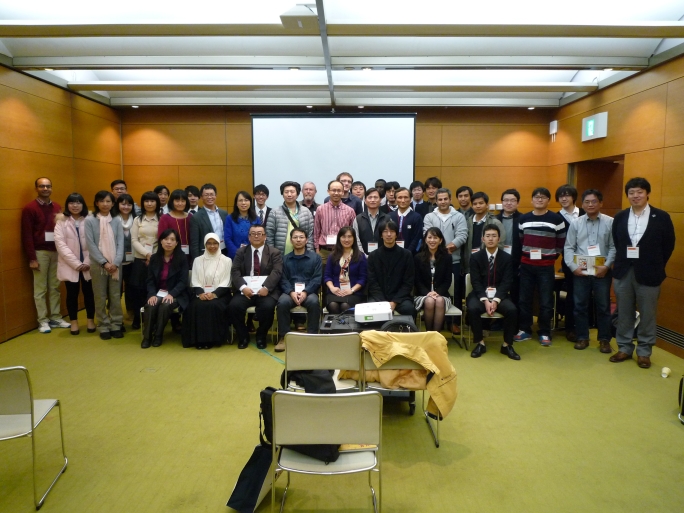The 7th Workshop on Modeling, Management and Generation of Problems/Questions in Technology-Enhanced Learning
at ICCE 2014 in Nara, Japan, on December 1, 2014.
Conference website: http://icce2014.jaist.ac.jp/icce2014/
The 7th Workshop on Modeling, Management and Generation of Problems/Questions in Technology-Enhanced Learning was successfully held. Thank you for your participation!
Solving problems/questions is one of the most indispensable and important components in the teaching and learning process. Problems/questions with adequate quality in various testing conditions are believed to enable teachers to assess individual studentsf capability and readiness of transfer in specific domain knowledge. Despite this, there are still many areas in need of systematic investigation to promote knowledge and skills on problems/questions-centered learning approach, including learning by problem solving and/or generation. For instance: what criteria constitute as adequate test item quality (in addition to frequently cited psychometric index like item difficulty, discrimination index); how to best assess learnerfs capability with appropriate quality level within constrains (e.g., an optimal number of items, time limitation, etc.); any feasible metadata heuristics and/or techniques for problems/questions selection; any promising alternative strategies for compiling a sufficient amount of number of problems/questions; any scaffolding techniques for question-generation implementation and instructional diffusion and so on.
In ICCE2006, 2007, 2009, 2010, 2011, and 2013, we held a series of workshops where we paid special attention to gquestions/problemsh in technology-enhanced learning. This is the 7th workshop focusing on the same topic. This continuous workshop will provide a good and timely opportunity to present and share the results and issues about "problems/questions" in ICCE community. We cordially invite presenters and participants who are interested in further exploring the many facets and potential uses of "problems/questions" in education/learning from a technological, computational, pedagogical, psychometrics, theoretical, sociological and administrative point of views.
All workshop participants are required to register for the main conference, but there will not be additional workshop fee.
Style of Workshop:
Mini-conference with paper presentations
Topics of interest include, but not limited to:
- Problem/question generation/authoring/posing
- Learning by problem/question-posing
- Problem/question variation/changing
- Problem analysis and evaluation
- Structurization of domain knowledge
- Problem/question selection
- Metadata or Ontology of problems
- Metacognition in problem-solving or problem-posing
- Test theory
- Instructional intervention for problem/question-authoring in classrooms
Workshop Program
| 13:00-13:30 | Sign-In & Equipment Hook-up |
|---|---|
| 13:30-13:40 | Opening speech |
| 13:40-14:35 | Session (I) |
| An Experimental Study on the Effects of an Online Student-Constructed Tests Learning Activity | |
| Fu-Yun Yu, Chia-Ling Su | |
| Revealing Students' Thinking Process in Problem-Posing Exercises: Analysis of First Sentence Selection | |
| Nur Hasanah, Yusuke Hayashi, Tsukasa Hirashima | |
| Exploring the Effects of Student Question-Generation Strategy | |
| Chun-Ping Wu, Shu-Ling Wu, Jing-Chou Yeah | |
| 14:45-15:50 | Session (II) |
| Structured Explanation Generation for Conceptual Understanding in Physics | |
| Tomoya Horiguchi, Takahito Toumoto, Tsukasa Hirashima | |
| Practical Use of of Interactive Environment for Learning by Problem-posing posing for One-step Multiplication and Division Word Problems | |
| Sho Yamamoto, Yuki Akao, Mitsutaka Murotsu, Takehiro Kanbe, Yuta Yoshida, Kazushige Maeda, Yusuke Hayashi, Tsukasa Hirashima | |
| Balance Control of Question-Posing Focusing on Learning Target Words on the Self-Study Material Contribution and Sharing System | |
| Toshihiro Hayashi, Yuji Hirai, Kazuhiro Ura, Akihiro Iwaki, Rihito Yaegashi, Hiroshi Murai, Hiroyuki Tarumi | |
| 15:50-16:00 | Closing speech |
Presentation Instructions
- For full paper presentation, 20 minutes will be allocated for presentation and 5 minutes for discussion. Please keep the presentation within the time limit set.
- For short paper presentation, 10 minutes will be allocated for presentation and 5 minutes for discussion. Please keep the presentation within the time limit set.
- Please check in with your Session Chair before the session in which your presentation begins.
- Standard computer with Windows7 and MS-Office will be set and connected to a projector in each session room. You can copy your presentation file (MS-PowerPoint or PDF) to this computer. You can also bring your own computer for presentation.
- Please set up and test your presentation in the designated room prior to your session.
Workshop Organizers
- Tsukasa Hirashima (Hiroshima University, Japan)
- Tomoko Kojiri (Kansai University, Japan)
- Kazuaki Kojima (Teikyo University, Japan)
- Tanja Mitrovic (University of Canterbury, New Zealand)
- Fu-Yun Yu (National Cheng Kung University, Taiwan)
PC Members
- Sergei Abramovich (State University of New York, USA)
- Toshihiro Hayashi (Kagawa University, Japan)
- Yuske Hayashi (Hiroshima University, Japan)
- Tatsuhiro Konishi (Shizuoka University, Japan)
- Hidenobu Kunichika (Kyusyu Institute of Technology, Japan)
- Yu-Feng Lan (National Formosa University, Taiwan)
- Nguyen-Thinh Le (Humboldt Univeristat zu Berlin, German)
- Noriyuki Matsuda (Wakayama University, Japan)
- Kazuhisa Seta (Osaka Prefecture University, Japan)
- Takahito Tomoto (Tokyo University of Science, Japan)
- Shin'ichi Tsumori (Kyushu Junior College of Kinki University, Japan)
- Maomi Ueno (The University of Electro- Communications, Japan)
